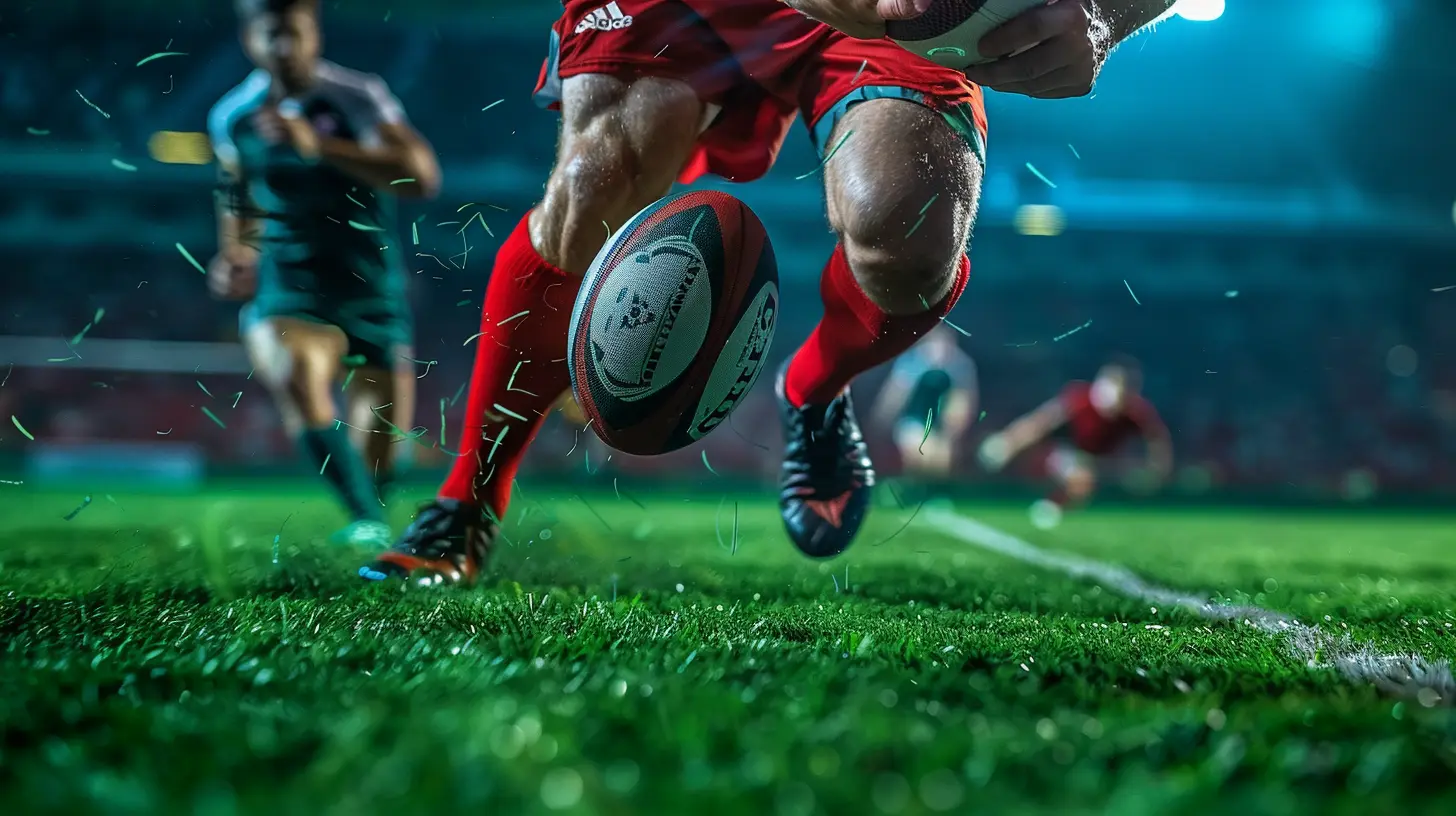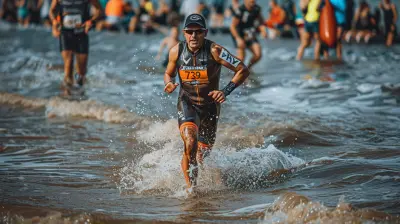Rugby Nutrition: What to Eat for Peak Performance
24 November 2025
When it comes to rugby, raw strength and killer workouts can only take you so far. What you put into your body is just as important as how you train. Picture your body like a high-performance engine—if you feed it junk, it’ll sputter and stall. But if you fuel it properly, it’ll power through scrums, tackles, and sprints like a beast.
In this guide, we're getting into the nitty-gritty of rugby nutrition: what to eat before, during, and after games and training. Whether you're a seasoned flanker or just starting out, this article will help you make smart food choices that actually boost your performance on the field.
Why Is Nutrition So Important in Rugby?
Let’s get real: rugby isn't a game for the faint-hearted. It’s physically demanding, fast-paced, and incredibly taxing on the body. You're running, tackling, lifting, scrumming, jumping—you name it. That level of action drains energy like crazy.So if you want to be explosive in the first half and still have gas in the tank after 80 minutes, your nutrition needs to be on point. The right diet helps you:
- Build lean muscle mass
- Recover faster between sessions
- Improve focus and reaction time
- Maintain energy levels throughout the match
Every meal is basically an opportunity to upgrade your performance.
Macronutrients: The Core Foundation
1. Carbohydrates – Your Primary Fuel Source
Carbs are the main energy source for rugby players. Full stop. Think of carbs like the petrol for your engine. Without them, you're running on fumes.Best carb sources:
- Brown rice
- Sweet potatoes
- Whole-wheat pasta
- Oats
- Fruits (bananas, apples, berries)
- Vegetables (especially starchy ones like peas and corn)
How much?
Depending on your training intensity, aim for 5–7 grams of carbs per kg of body weight each day. On intense training or match days? You might need even more.
2. Protein – Build and Repair Muscle
You’re basically tearing your muscles apart every time you train or play, and protein is what patches them up—stronger than before. No protein, no gains.Best protein sources:
- Chicken breast
- Lean beef
- Eggs
- Greek yogurt
- Salmon
- Plant-based options: lentils, tofu, tempeh
How much?
Rugby players typically need around 1.6–2.2 grams of protein per kg of body weight daily. Spread it out during the day—don’t just cram it all into one meal.
3. Fats – The Unsung Hero
Fats aren’t the enemy—far from it. They help regulate hormones, keep joints healthy, and provide a longer-lasting energy source.Best fat sources:
- Avocados
- Nuts and seeds
- Olive oil
- Fatty fish like salmon or mackerel
- Nut butters
Just don’t overdo it, especially before a game—you don’t want to feel too heavy or sluggish.
Timing Is Everything: When to Eat
You can't just eat right randomly and expect magic. Timing your meals strategically can make a huge difference in energy levels and recovery.Pre-Game Fuel
When? About 2–3 hours before kickoffWhat to eat?
- Grilled chicken or turkey
- Brown rice or whole-wheat pasta
- Steamed vegetables
- A piece of fruit
This gives you slow-releasing energy and keeps you full without weighing you down.
Quick snack 30–60 mins before? Go for something light and carb-rich:
- Banana
- Energy bar
- Toast with honey
Avoid anything greasy, fried, or too fibrous—you don’t want to be running with a rock in your stomach.
During the Match (Yes, Really)
If it's a long match or you're training hard for over an hour, you might want to top off your energy mid-action.Quick energy boosters:
- Sports drinks
- Energy gels
- Dried fruit
- Jelly beans (yeah, they work!)
These fast-digesting carbs give you a quick energy bump when you’re flagging.
Post-Game/Post-Training Recovery
This is where the magic happens. The 30–60 minutes after a match or workout is prime time to refuel and repair.What your body needs:
- Protein to repair muscle
- Carbs to replenish glycogen
- Fluids and electrolytes to rehydrate
Recovery meal ideas:
- Grilled salmon with mashed sweet potato and green beans
- Protein shake with banana and oats
- Chicken wrap with avocado and spinach
And don't forget to hydrate—your muscles are basically screaming for water and salts after a session.
Hydration: Don’t Sleep on It
You can eat clean every day of the week, but if you’re dehydrated, forget about peak performance. Dehydration messes with everything—energy levels, muscle function, even how sharp your mind is.Pro tips:
- Drink water throughout the day—not just before games.
- During intense training or long matches, consider electrolyte drinks to replace the sodium, potassium, and other minerals you lose through sweat.
- Weigh yourself before and after a training session. Lost weight = mostly water. Replace every kg of lost body weight with 1.5 liters of fluid.
Supplements: Do You Really Need Them?
Let’s keep it real—supplements aren’t magic. They can help if your basic nutrition is already solid. Think of them like the final polish, not the foundation.Useful ones for rugby players:
- Whey protein – Quick and easy way to meet protein needs post-training
- Creatine – Helps with strength and muscle gains
- Omega-3s – Anti-inflammatory benefits, great for joints
- Beta-Alanine – Can improve endurance during high-intensity efforts
- Vitamin D – Especially important in the winter months or for indoor athletes
But keep in mind: always check that supplements are batch-tested and safe for sport. You don’t want to risk a ban over a dodgy product.
Game Day Meal Plan
Here’s a simple meal plan to help you crush match day.Breakfast (3–4 hours before):
- Oats with sliced banana and a spoonful of peanut butter
- 2 scrambled eggs
- Glass of water or diluted sports drink
Pre-game snack (60 mins before):
- Energy bar or fruit
- Small handful of raisins or dates
- Sips of water
During game (halftime):
- Energy gel or sports drink
- Banana
Post-game:
- Protein shake with milk, banana, and oats
- Full meal within 1–2 hours: chicken curry with rice and veggies or turkey sandwich with side salad and sweet potato fries
Nutrition for Specific Rugby Positions
Not all positions in rugby are built the same—and neither are their nutritional needs. Here's a quick breakdown:Forwards (Props, Locks, Flankers)
- Higher calorie and protein needs due to size and physical demands- Focus on strength, power, and recovery
- Meals should be dense and nutrient-packed
Backs (Scrum-half, Fly-half, Wingers, Full-back)
- Need to stay light, agile, and quick- Emphasize carbs for energy and moderate protein for muscle maintenance
- Watch portion sizes to avoid unwanted mass gain
Hookers and Number 8s
- Hybrid players who do everything- Well-balanced diet of high carbs, adequate protein, and quality fat
Common Nutrition Mistakes Rugby Players Make
Even elite athletes can mess up here and there. Here are a few red flags to watch out for:- Skipping meals: You’re leaving gains and recovery on the table.
- Over-relying on supplements: Real food should always come first.
- Under-eating on rest days: Recovery is when you grow—don’t starve your body.
- Not hydrating enough: Performance tanks faster than you think without fluids.
- Copying someone else’s diet: You’re unique. What works for your teammate might not work for you.
Final Thoughts
Rugby is rough, rugged, and relentless—and your body needs the right fuel to handle it. From pre-game carbs to post-game protein, every bite you take matters. You don’t need to eat like a robot, but you do need to stay consistent.Remember: Eat smart. Train hard. Recover like a pro. That’s the secret sauce to dominating on the pitch.
If you're serious about taking your game to the next level, stop winging your meals. Rugby nutrition isn’t rocket science—but it is the game-changer you've been ignoring.
all images in this post were generated using AI tools
Category:
RugbyAuthor:

Uziel Franco
Discussion
rate this article
2 comments
Lulu Strickland
Fuel your passion with the right nutrition! Eating well empowers your body, enhancing strength and endurance on the field. Let's embrace the challenge and elevate our game together! 🏉💪 #RugbyStrong
December 7, 2025 at 12:02 PM

Uziel Franco
Absolutely! Proper nutrition is key for optimal performance on the field. Fuel your body with the right foods to maximize strength and endurance. Together, we can take our game to the next level! 🏉💪
Alvin Alvarez
Great insights on rugby nutrition! Fueling the body with the right foods is essential for peak performance. Remember, every bite counts towards your goals. Stay dedicated, keep experimenting with your diet, and you’ll see the results on the field! Keep pushing!
November 24, 2025 at 4:27 AM

Uziel Franco
Thank you! I appreciate your feedback and support. Every bite truly makes a difference in performance. Let's keep working towards those goals!


